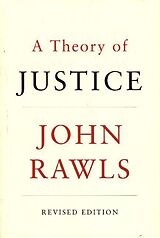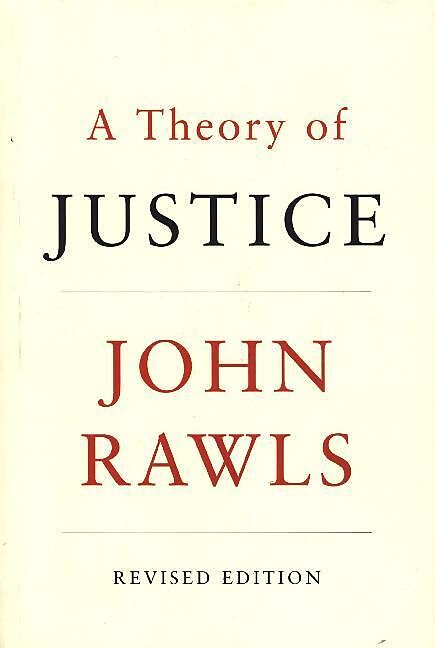A Theory of Justice, Revised Edition
Einband:
Kartonierter Einband
EAN:
9780674000780
Untertitel:
Revised Edition
Genre:
Recht
Autor:
John Rawls
Herausgeber:
Harvard University Press
Auflage:
rev. ed.
Anzahl Seiten:
560
Erscheinungsdatum:
1999
ISBN:
978-0-674-00078-0
Informationen zum Autor John Rawls was James Bryant Conant University Professor at Harvard University. He was recipient of the 1999 National Humanities Medal. Klappentext Since it appeared in 1971, John Rawls's "A Theory of Justice" has become a classic. The author has now revised the original edition to clear up a number of difficulties he and others have found in the original book. Rawls aims to express an essential part of the common core of the democratic tradition--justice as fairness--and to provide an alternative to utilitarianism, which had dominated the Anglo-Saxon tradition of political thought since the nineteenth century. Rawls substitutes the ideal of the social contract as a more satisfactory account of the basic rights and liberties of citizens as free and equal persons. "Each person," writes Rawls, "possesses an inviolability founded on justice that even the welfare of society as a whole cannot override." Advancing the ideas of Rousseau, Kant, Emerson, and Lincoln, Rawls's theory is as powerful today as it was when first published. Zusammenfassung Since it appeared in 1971! John Rawls's A Theory of Justice has become a classic. The author has now revised the original edition to clear up a number of difficulties he and others have found in the original book. Inhaltsverzeichnis Preface for the Revised Edition Preface PART ONE THEORY Chapter Justice as Fairness The Role of Justice The Subject of Justice The Main idea of The Theory of Justice The Original Position and Justification Classical Utilitarianism Some Related Contrasts Intuitionism The Priority Problem Some Remarks about Moral Theory The Principles of Justice Institutions and Formal Justice Two Principles of Justice Interpretations of The Second Principle Democratic Equality and The Difference Principle Fair Equality of Opportunity and Pure Procedural Justice Primary Social Goods as The Basis of Expectations Relevant Social Positions The Tendency to Equality Principles for Individuals: The Principle of Fairness Principles for Individuals: The Natural Duties The Original Position The Nature of The Argument for Conceptions of Justice The Presentation of Alternatives The Circumstances of Justice The Formal Constraints of The Concept of Right The Veil of Ignorance The Rationality of The Parties The Reasoning Leading to The Two Principles of Justice The Reasoning Leading to The Principle of Average Utility Some Difficulties with The Average Principle Some Main Grounds for The Two Principles of Justice Classical Utilitarianism! Impartiality! and Benevolence PART TWO: INSTITUTIONS Equal Liberty The Four-Stage Sequence The Concept of Liberty Equal Liberty of Conscience Toleration and The Common Interest Toleration of The Intolerant Political Justice and The Constitution Limitations on The Principle of Participation The Rule of Law The Priority of Liberty Defined The Kantian Interpretation of Justice as Fairness Distributive Shares The Concept of Justice in Political Economy Some Remarks about Economic Systems Background Institutions for Distributive Justice The Problem of Justice between Generations Time Preference Further Cases of Priority The Precepts of Justice Legitimate Expectations and Moral Desert Comparison with Mixed Conceptions The Principle of Perfection Duty and Obligation The Arguments for The Principles of Natural Duty The Arguments for The Principle of Fairness The Duty to Comply with an Unjust Law The Status of Majority Rule The Definition of Civil Disobedience The Definition of Conscientious Refusal The Justification of Civil Disobedience The Justification of Conscientious Refusal The Role of Civil Disobedience PART THREE: ENDS Goodness as Rationality The Need for a Theory of The Good The Definition of Go...
Autorentext
John Rawls
Klappentext
"Each person" writes John Rawls, "possesses an inviolability founded on justice that even the welfare of society as a whole cannot override. Therefore in a just society the rights secured by justice are not subject to political bargaining or to the calculus of social interests".In this book Mr. Rawls attempts to account for these propositions, which he believes express our intuitive convictions of the primacy of justice. The principles of justice he sets forth are those that free and rational persons would accept in an initial position of equality. In this hypothetical situation, which corresponds to the state of nature in social contract theory, no one knows his or her place in society; his or her class position or social status; his or her fortune in the distribution of natural assets and abilities; his or her intelligence, strength, and the like; or even his or her conception of the good. Thus, deliberating behind a veil of ignorance, people determine their rights and duties. The first, theoretical, section of the book addresses objections to the theory and alternative positions, especially utilitarianism. The author then applies his theory to the philosophical basis of the constitutional liberties, the problem of distributive justice, and the definition of the ground and limits of political duty and obligation. He includes here discussion of the issues of civil disobedience and conscientious objection. Finally, he connects the theory of justice with a doctrine of the good and of moral development. This enables him to formulate a conception of society as a social union of social unions and to use the theory of justice to explain the values of community.Since the appearance ofthe book in 1971, A Theory of Justice has been translated into 23 languages. Revisions to the original English text have been included in translations since 1975. This new English edition incorporates all those revisions, which the author considers to be significant improvements, especially to the discussions of liberty and primary goods. The Preface for the Revised Edition discusses the revisions in some detail.
Zusammenfassung
Since it appeared in 1971, John Rawls's A Theory of Justice has become a classic. The author has now revised the original edition to clear up a number of difficulties he and others have found in the original book.
Inhalt
Preface for the Revised Edition Preface PART ONE THEORY Chapter Justice as Fairness The Role of Justice The Subject of Justice The Main idea of The Theory of Justice The Original Position and Justification Classical Utilitarianism Some Related Contrasts Intuitionism The Priority Problem Some Remarks about Moral Theory The Principles of Justice Institutions and Formal Justice Two Principles of Justice Interpretations of The Second Principle Democratic Equality and The Difference Principle Fair Equality of Opportunity and Pure Procedural Justice Primary Social Goods as The Basis of Expectations Relevant Social Positions The Tendency to Equality Principles for Individuals: The Principle of Fairness Principles for Individuals: The Natural Duties The Original Position The Nature of The Argument for Conceptions of Justice The Presentation of Alternatives The Circumstances of Justice The Formal Constraints of The Concept of Right The Veil of Ignorance The Rationality of The Parties The Reasoning Leading to The Two Principles of Justice The Reasoning Leading to The Principle of Average Utility Some Difficulties with The Average Principle Some Main Grounds for The Two Principles of Justice Classical Utilitarianism, Impartiality, and Benevolence PART TWO: INSTITUTIONS Equal Liberty The Four-Stage Sequence The Concept of Liberty Equal Liberty of Conscience Toleration and The Common Interest Toleration of The Intolerant Political Justice and The Constitution Limitations on The Principle of Participation The Rule of Law The Priority of Liberty Defined The Kantian Interpretation of Justice as Fairness Distributive Shares The Concept of Justice in Political Economy Some Remarks about Economic Systems Background Institutions f…

Leider konnten wir für diesen Artikel keine Preise ermitteln ...
billigbuch.ch sucht jetzt für Sie die besten Angebote ...
Die aktuellen Verkaufspreise von 6 Onlineshops werden in Realtime abgefragt.
Sie können das gewünschte Produkt anschliessend direkt beim Anbieter Ihrer Wahl bestellen.
Loading...
Die aktuellen Verkaufspreise von 6 Onlineshops werden in Realtime abgefragt.
Sie können das gewünschte Produkt anschliessend direkt beim Anbieter Ihrer Wahl bestellen.
| # | Onlineshop | Preis CHF | Versand CHF | Total CHF | ||
|---|---|---|---|---|---|---|
| 1 | Seller | 0.00 | 0.00 | 0.00 |
